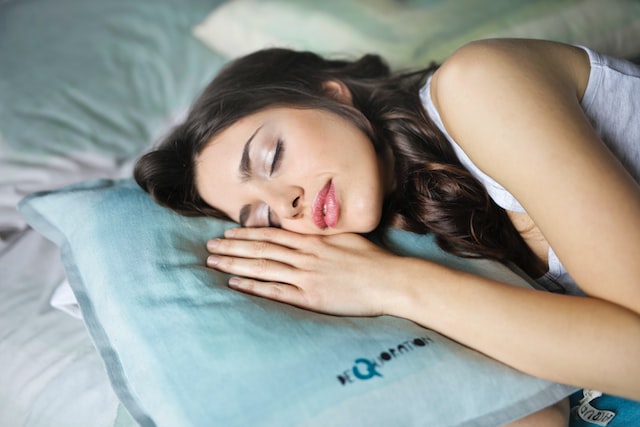
Image from Unsplash
Many people lack sleep.
People wake up early in the morning to get their kids ready for school or go to the gym to get in a workout before going to work. Usually turn to bed late because we have obligations in the evening, such as attending company gatherings or catching up on personal admin. And when our heads eventually hit the pillow, they are so preoccupied with what’s going to happen tomorrow that we can’t even fall asleep!
Getting a good night’s sleep must be one of the top objectives rather than seeing it as a “nice to have.” If you don’t get enough of it, it might affect your health and productivity at work.
Exercise Consistently
Regular exercise might help you sleep better. Endorphins, feel-good chemicals that you produce, treat sadness and anxiety by lowering stress and improving mood. Even a 20- to 30-minute minute workout each day might be beneficial.
But work out in the mornings and afternoons. It is more difficult to fall asleep if you engage in an intense activity two to three hours before bed.
Increase Your Daylight Exposure
Your body creates more melatonin, a sleep-inducing hormone, the more natural light you are exposed to. Aim for 2 to 3 hours every day, as this will aid your ability to sleep at night.
The absence of natural light in a workplace may cause you to feel exhausted throughout the day. At midday, get outside and, if feasible, work near a window.
Prevent Eating Big Meals Almost Time for Bed
When you have a big supper, you could discover that sleeping is difficult when your stomach passes through the digestive it. Spicy and acidic meals might give you heartburn, which makes it more challenging to get a good night’s sleep.
However, a little snack before bed may sate your appetite and help you go to sleep. Consume sugar-free items like bananas or whole-grain cereal with milk, yogurt, or granola.
Avoid Consuming Alcohol or Caffeine in the Evening
Avoiding caffeinated and alcoholic drinks close to bedtime is recommended for optimal sleep hygiene. Limit caffeine intake to the morning since it may linger in your body for up to twelve hours. And although alcohol might aid in falling asleep, it may wake you up many times during the night, so take it sparingly.
Reduce Stress Before Sleep
Before going to bed, jot down any causes of tension since it’s crucial to feel relaxed. If you’ve got a To-Do List, check off the items you completed that day and then list the things you need to get done the next day. By doing this, you’ll be able to relax and stop worrying that you’ll forget anything crucial while sleeping.
Create a Regular Sleep Schedule
Sleeping well is more likely if you adhere to a regular bedtime and wake time. The key is consistency, so avoid straying from your routine on the weekends when it could be more alluring to stay awake late and afterward sleep the following morning.
Experiment over a week or two to find your perfect sleep routine. Every night, at the same hour, go to bed and fall asleep until you feel awake. You’ll eventually perform it at the same period every day.
Take Melatonin Pill
Melatonin is a key sleep hormone that sends signals to your brain telling it to settle down and get some shut-eye. Melatonin is a popular synthetic and natural sleep aid. Taking melatonin before bed is a common practice and one of the easiest ways to sleep fast.
Maintain Your Regular Routine
Create a nighttime ritual to help you relax and stay in the correct mind. Take a soothing bath, for instance, or read a book while sipping herbal tea. The ability to calm down before bed may be achieved via meditation and other relaxation methods.
Create the Ideal Environment
Avoid working or watching TV in your bedroom. If you use your bed for sleeping, your body and mind will understand that getting into it denotes that it is time to turn in for the night.
A temperature of about 65°F (18°C) and good ventilation are ideal in your bedroom. Play soothing music and white noise to drown out any surrounding noise.
When you turn off the light in your bedroom, ensure the room is dark and use low-wattage lightbulbs. Use an eye mask or buy blackout curtains to achieve this. If you have to get up in the middle of the night, don’t switch on your main lights; doing so will likely wake you up. Instead, use a side light.
Keep a Sleeping Log
You may find the behaviors that hinder your capacity to sleep by keeping a sleep journal. Keep a record of your pre-bedtime food and drink, especially alcohol or caffeine. Include this information together with any medications you take.
Mention whether you exercised, engaged in calming activities, or had a very stressful day. This will demonstrate what influences your ability to fall asleep favorably or unfavorably.
Before you head to bed, jot down your thoughts. Don’t forget to log your sleep schedule. Consider how you look first thing in the morning. You’ll learn to see patterns with practice, and you may utilize this knowledge to get better sleep.
Conclusion
Sleeping better is essential for mental, physical, and emotional health. There are many ways to help you sleep better, from changing your diet and lifestyle to using natural sleep aids and changing your sleep environment. You may enhance your sleep and health by taking the time to learn about your sleep requirements and experimenting with various approaches. With the right combination of strategies, you can make real progress in improving your sleep and help you get the restful nights you need.


